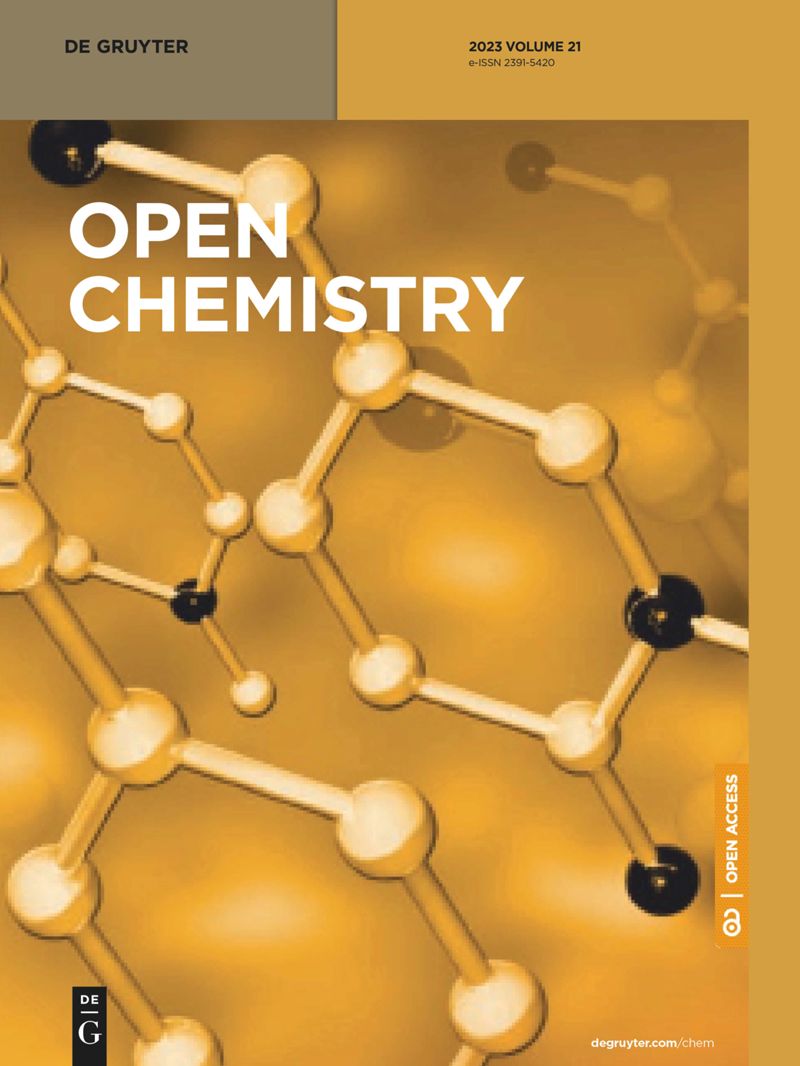Sonochemical synthesis of gold nanoparticles mediated by potato starch: Its performance in the treatment of esophageal cancer
IF 1.9
4区 化学
Q3 CHEMISTRY, MULTIDISCIPLINARY
引用次数: 0
Abstract
Economically viable and eco-friendly potato starch (PS) was employed to synthesize Au NPs under ultrasound irradiation. PS phytochemicals have the function of a green reductant as well as an efficient stabilizer template to cap and synthesize gold nanoparticles. Transmission electron microscopy (TEM), UV-Vis spectroscopy, X-ray diffraction (XRD), scanning electron microscopy (SEM), and energy-dispersive X-ray spectroscopy (EDX) were applied to investigate the structure of the synthesized PS-Au NPs nanocomposite. FESEM results showed that the obtained Au NPs were spherical and ∼30 nm in diameter; their crystalline nature was detected by XRD and TEM data. PS-Au NP nanocomposite shows high antioxidant effects against DPPH. The colorimetric MTT investigation was followed in the determination of anti-esophageal cancer properties of the PS-Au NP nanocomposite against KYSE-30 and FLO-1 cell lines. The findings indicate that in 3 days, the cancer cell survival percentage in various dilations reduced as much as the PS-Au NP nanocomposite concentration increased. The best anti-cancer effect of the PS-Au NP nanocomposite was reported at 1,000 μg/mL dilation. Through MTT cytotoxicity analysis the half-maximal inhibitory concentration of PS-Au nanocomposite or IC50 values against the KYSE-30 and FLO-1 esophageal carcinoma cells were found as 125 and 176 μg/mL, respectively. The data indicated that these PS-Au NP nanocomposites inhibited esophageal cancer cells more strongly than normal cells.马铃薯淀粉介导的金纳米粒子的声化学合成:在食道癌治疗中的表现
在超声辐照下,采用经济可行且环保的马铃薯淀粉(PS)合成金纳米粒子。马铃薯淀粉(PS)植物化学物质具有绿色还原剂和高效稳定剂模板的功能,可用于封盖和合成金纳米粒子。应用透射电子显微镜(TEM)、紫外可见光谱、X射线衍射(XRD)、扫描电子显微镜(SEM)和能量色散 X 射线光谱(EDX)研究了合成的 PS-Au NPs 纳米复合材料的结构。扫描电子显微镜(FESEM)结果表明,所获得的金纳米粒子呈球形,直径为 30 nm;XRD 和 TEM 数据均检测到其晶体性质。PS-Au NP 纳米复合材料对 DPPH 具有很高的抗氧化效果。在测定 PS-Au NP 纳米复合材料对 KYSE-30 和 FLO-1 细胞株的抗食道癌特性时,采用了 MTT 比色法。研究结果表明,在 3 天内,随着 PS-Au NP 纳米复合材料浓度的增加,癌细胞在不同稀释度下的存活率也随之降低。PS-Au NP 纳米复合材料的最佳抗癌效果出现在 1,000 μg/mL 稀释度时。通过 MTT 细胞毒性分析发现,PS-Au 纳米复合材料对 KYSE-30 和 FLO-1 食管癌细胞的半数最大抑制浓度或 IC50 值分别为 125 和 176 μg/mL。数据表明,这些 PS-Au NP 纳米复合材料对食管癌细胞的抑制作用比正常细胞更强。
本文章由计算机程序翻译,如有差异,请以英文原文为准。
求助全文
约1分钟内获得全文
求助全文
来源期刊

Open Chemistry
CHEMISTRY, MULTIDISCIPLINARY-
CiteScore
3.80
自引率
4.30%
发文量
90
审稿时长
6 weeks
期刊介绍:
Open Chemistry is a peer-reviewed, open access journal that publishes original research, reviews and short communications in the fields of chemistry in an ongoing way. The central goal is to provide a hub for researchers working across all subjects to present their discoveries, and to be a forum for the discussion of the important issues in the field. The journal is the premier source for cutting edge research in fundamental chemistry and it provides high quality peer review services for its authors across the world. Moreover, it allows for libraries everywhere to avoid subscribing to multiple local publications, and to receive instead all the necessary chemistry research from a single source available to the entire scientific community.
 求助内容:
求助内容: 应助结果提醒方式:
应助结果提醒方式:


